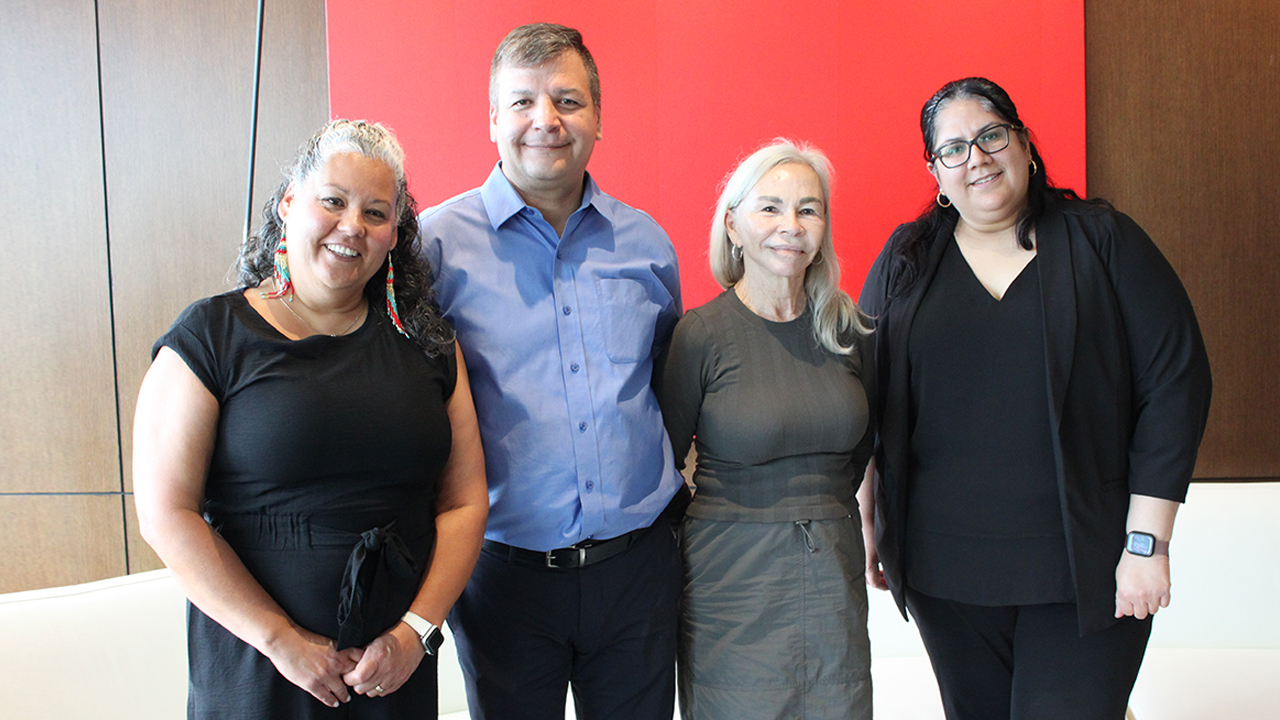
How the Indigenous Partnership Council is helping guide United Way Greater Toronto’s approach
As we face an evolving future with complex, interrelated challenges, acknowledging the truth and reconciling the trauma inflicted on First Nations, Inuit, and Métis peoples, we at United Way Greater Toronto (UWGT) continue to grow and adapt to the needs of our communities. This can mean knowing when to learn, listen and support others to lead culturally-responsive solutions. The creation of the Indigenous Partnership Council (IPC) marks a change in approach for United Way — and a step towards reconciliation.
Michelle MacDonald, our Senior Manager of Indigenous Collaboration, works closely with the council and the communities it represents. She explains the role of the IPC and why it’s essential to our mission.
What is the Indigenous Partnership Council? Who is represented on it?
Simply put, the Indigenous Partnership Council is led by Indigenous voices, for Indigenous Peoples. It includes leaders from educational facilities, shelters and housing and social service organizations. It is guided by Indigenous decision making and remains accountable and transparent to the First Nations, Inuit and Métis Peoples it serves across what we call Peel, Toronto and York Region, land that is the traditional territory of many Indigenous nations, such as the Wendat, Anishnaabeg and Haudenosaunee. Land that is covered by several treaties, such as Treaty 12 with the Mississaugas of the Credit First Nation and the Williams Treaties with seven First Nations, including the Chippewas of Georgina Island.
How does the IPC work with United Way?
The Indigenous Partnership Council guides and informs the implementation of UWGT’s Reconciliation and Equity Action (REA) Plan. It helps to strengthen relationships between United Way and Indigenous communities and to address social and economic inequities among Indigenous peoples across the GTA.
The council plays a vital role in shaping United Way’s efforts to address the multifaceted needs of Indigenous communities, uphold Indigenous self-determination, and direct resources to where support is most needed.
The council also strengthens the capacity of Indigenous organizations to plan, lead and deliver initiatives for their communities and makes recommendations on Indigenous-led investments, fundraising and research.
Can you share more about the guiding principles the council follows?
Members of the IPC are guided by the Seven Grandfather’s Teachings:
- Love: It is important to care for one another. Foster reciprocal relationships, recognizing the important contribution that each member, community partners and other stakeholders make to the success of the council.
- Respect: Give it, earn it, receive it. Respect the dignity and self-worth of council members and stakeholders.
- Courage: Let nothing stand in the way of doing the right thing. Support Indigenous self-determination.
- Honesty: Better to fail with honesty than succeed by fraud.
- Truth: It is always easiest to speak the truth. Demonstrate responsibility through participation.
- Humility: To be humble about your accomplishment is to be strong. Deliberate in many voices but govern with consensus.
- Wisdom: With hard work and dedication will come knowledge
This position has given me the opportunity to integrate these teachings into every interaction, allowing me a path to return to ways that continue to inform me.
I’ve been fortunate to build relations with council members, fostering trusting and respecting relationships that will grow with time. Their time and guidance have fostered my learning and understanding of the needs of First Nations, Inuit, and Métis Peoples in our communities.
What are some of the initiatives/plans the council is working on?
The Indigenous Partnership Council’s long-term vision is to create a unique place where individuals can receive cultural and clinical supports to address mental health needs and substance dependency.
This vision aims to provide a safe, therapeutic environment that honours traditions, respects gender and 2-Spirit needs and encourages holistic healing.
I am deeply excited and hopeful about the collaborative work we are doing, alongside our partners in Peel, Toronto and York Region, to highlight the strengths of Indigenous communities and find solutions that address the diverse and complex needs of First Nations, Inuit and Métis Peoples.
Why is it important for United Way to have this partnership?
United Way Greater Toronto recognizes the direct link between colonial history and trauma and the disproportionate impact of poverty on Indigenous communities. We strive to be a better partner to Indigenous-led agencies and the communities they serve.
We know that we must play an active role, but more importantly, we must work with and support First Nations, Métis and Inuit Peoples as they lead culturally responsive solutions. This partnership is a demonstration of trust in Indigenous-led organizations to determine the investments that best meet the complex and layered needs of First Nation, Inuit and Métis Peoples, honouring and supporting Indigenous self-determination and providing funding where it will have the greatest impact.